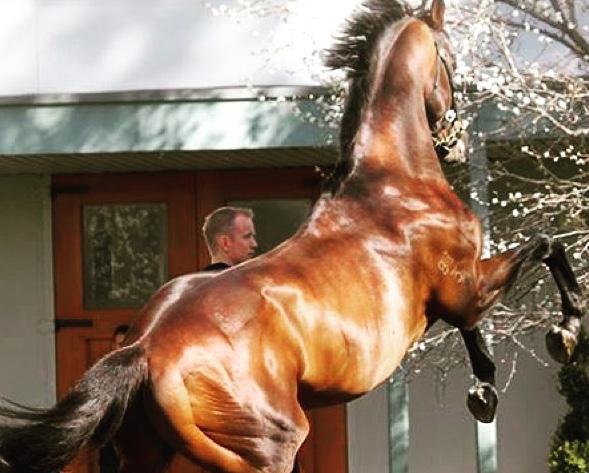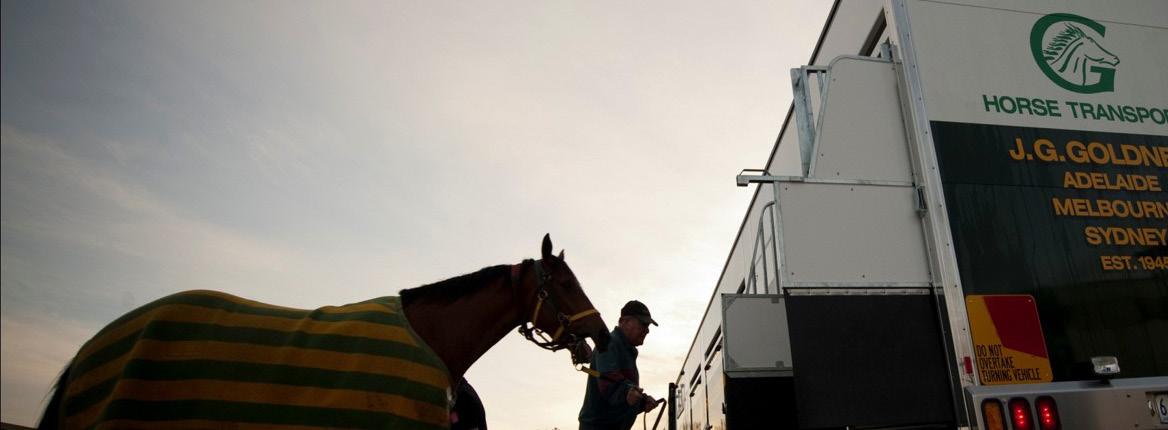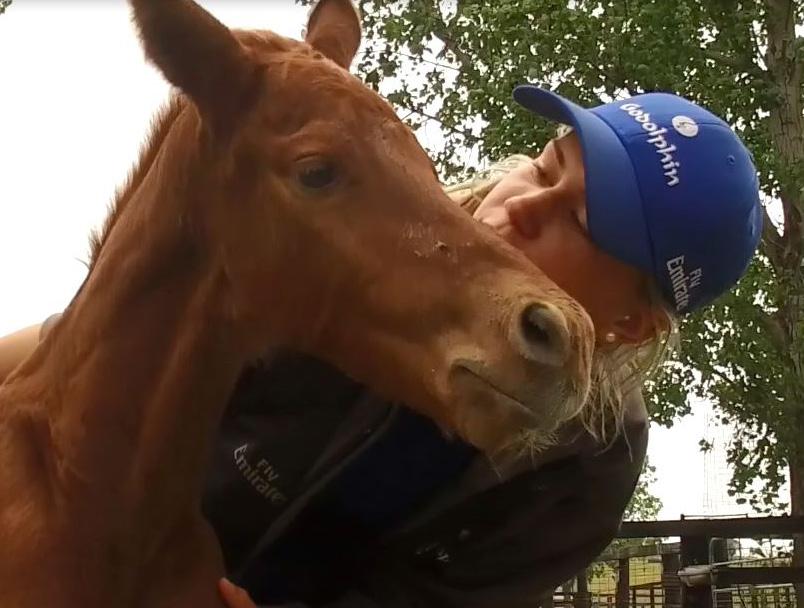
14 minute read
Careers with Horses
Stud Hand Stallion Handlers & Grooms Yearling Manager Foaling Manager Night-watch Foaling Attendant Horse Educator Stud Manager Operations Manager Transport Full Time Stud Trainee School Based Trainee Racing and Training
Turn your passion into a rewarding career
There are many and varied roles within the Hunter Thoroughbred Breeding Industry depending on your skills and qualifications. It is important to realise that the bloodstock industry is a vastly diverse and irrespective of age, gender, experience or qualifications, there will be a role in the industry that best compliments your skill set or attributes. Whether you are straight out of secondary or tertiary education, or looking for a career change later in life, the Hunter Valley Breeding Industry presents a huge variety of interesting, exciting and challenging opportunities. The following will give you a snapshot of what’s involved and may help steer you in the right direction for a rewarding career in the thoroughbred industry.

Stud Hand and Stud Grooms
Fundamental to the day to day running and operation of any stud farm, it is a role that allows you to develop a comprehensive understanding of the practical aspects of running any stud farm. Stud grooms are the backbone of the farm, ensuring the day to day care of the horses and farm is of the highest standards. Developing an understanding of the day to day workings of a stud farm will give you the greatest grounding you could receive for a career in the Thoroughbred Breeding Industry and will provide you with much of the knowledge that you will need to one day manage a large commercial thoroughbred farm or your own business. The foundations of a good racehorse are established during its youth and experiencing life on a stud farm can help you to understand and experience the fundamental aspects of breeding a quality horse. It can also lead to other roles within the industry and is a great way to gauge where your career may head in the future.
Daily tasks may include:
• Grooming and feeding horses. • Moving horses around the farm. • Assisting Managers and supervisors. • Cleaning stables and yards. • Feeding and grooming of horses. • Cleaning of stables and yards. • General stable maintenance such as cleaning water troughs and small repairs. • Treatment of minor injuries and wounds on horses. • Ordering of feed, veterinary and saddlery supplies. • Ensuring quarantine procedures are adhered to. • With experience, grooms may also be given the opportunity to assist in foaling mares. • Handling of young horses and preparation of these horses for sales. • This includes teaching horses to lead, washing, grooming and putting horses on the walking machine. • Presentation of weanlings, yearlings and mares to prospective buyers at horse sales. • Preparation of mares for entry to the serving barn during the breeding season. • Some grooms that are employed on larger farms with international operations or grooms with adequate knowledge and expertise from smaller operations may also have the opportunity to travel to these farms.
Stallion Handlers & Grooms
The role of a Stallion handler is essentially a progression from that of a stud groom. It requires a high standard of horsemanship which is generally developed during time as a stud groom. Being a stallion handler sees involvement in the management of stallions and the mare covering process. There is the significant responsibility of looking after these highly valued thoroughbreds and seeing the safe practices of serving (or covering) broodmares during the breeding season, adhering to Quarantine practices and safety management is a key requirement for this role. Stallion handlers employed by international studs may also be required to travel to the northern hemisphere for the breeding season which follows on directly after the Australian breeding season.
Daily tasks may include:
• Control of stallions during the mating of mares. • Control of mares during the mating process. • Preparation and presentation of stallions to clients at stud stallion parades. • Putting stallions on exercise walkers and/or hand walking. • Ensuring quarantine procedures are adhered to. • International Travel

Yearling Manager
Managing the preparation of yearlings for major thoroughbred sales comes with a high level of responsibilities, including the management of staff throughout the yearling preparation process, supervising all aspects of sales drafts (group of horses) with presentation to the highest standard, and attending sales not only in Australia but occasionally overseas. Most Yearling managers start off their careers as Stud Grooms and will work to a career path with Yearlings by ascertaining the skills necessary showing leadership, horsemanship, attention to detail and safety for horses and people.
Daily tasks may include:
• Grooming and feeding horses. • Exercising horses in the walker or round yards. • Managing nutrition and exercise regimes for the horses in the sales drafts. • Attending sales. • Parading horses for clients on the farm or at the sales. • Liaising with clients at sales. • Managing staff and ensuring the workload is completed to the highest standard and safety. • Travelling interstate and overseas.


Foaling Manager
Cares for the pregnant mares during their late pregnancy through to post foaling. They will also work closely with the Veterinarian caring and treating mares that may have difficult pregnancies. The Foaling Manager looks after the foals during and after they’re born until they’re ready to join the other mares and foals out in the paddock. This role has many similarities to a midwife at a hospital.
Daily tasks may include:
• Foaling Mares • Veterinary treatments in the hospital barn. • Monitoring high risk pregnancies. • Guiding and teaching staff. • Reporting to management on each mare and foal in their care.

Night-Watch Foaling Attendant
This role is similar to that of a midwife in a hospital, a Night-watch foaling attendant is key for any commercial broodmare farm. As a majority of foals are born in the wee hours of the night and it’s crucial to have the right person on the job. Night-Watch Attendants typically start out as Stud Grooms or Vet nurses and would have either extensive experience and/or study to ensure the best outcome of every foaling. Veterinarians are on call for difficult cases or emergency situations.
Daily tasks may include:
• Checking the mares regularly overnight. • Foaling down mares. • Administering treatments for mares and foals. • Observations of post foaling mares and their newborns. • Ensuring sanitary conditions in and around the foaling unit, cleaning stables and checking water.

Horse Educator
Educators may start out with horses as a stable hand or stud groom, while some are born and raised in a family horse business. Others have come from various backgrounds all of which are passionate about hores. Many horses start out their lives with an educator from the weaning process, this is a crucial part of a horses life and requires skill, understanding the horses nature and patience among all. It is about knowing a horse’s abilities and strengths and preparing them for their lives either on the race track, a performance horse or as a broodmare. To become an educator takes a lot of experience working with horses and working in the studs and stables. Working their way up the ladder to gain experience and knowledge to have their own stables, while others are employed by larger stables and can find themselves travelling the world with horses. This a highly competitive area, and not everyone can make it. Apart from having experience with horses, trainers must also have good communication skills, as they need to manage staff and communicate with owners and potential owners.
Stud Manager
A Stud manager has significant responsibilities in managing horse breeding activities. Leading and overseeing the work of employees in the company. Ensuring the efficiency of business operations as well as setting strategic goals for the future. Well-versed in all matters business and a competent leader able to provide guidance that enhances performance in a manner which incorporates the company’s vision and culture. Ensuring the profitability of the company’s activities to drive sustainable development and long-term success.
Daily tasks may include:
• Managing bloodstock, physical and natural resources. • Business administration. • Staff management and training. • Supporting the marketing of bloodstock. • Develop goals and objectives that lead to growth and prosperity. • Design and implement business plans and strategies to promote the attainment of goals. • Ensure that company has the adequate and suitable resources to complete its activities (e.g. people, material, equipment etc.) • Organise and coordinate operations in ways that ensure maximum productivity. • Supervise the work of employees and provide feedback and counsel to improve efficiency and effectiveness. • Maintain relationships with partners/vendors/ suppliers. • Gather, analyse and interpret external and internal data and write reports. • Assess overall company performance against objectives. • Represent the company at events, conferences etc. • Ensure adherence to legal rules and guidelines.

Operations Manager
An Operations Manager plans, directs and coordinates an organisation’s operations. They are responsible for improving performance, productivity, efficiency, profitability, managing a team of managers, training managers through the implementation of effective policies.
Daily tasks may include:
• Ensuring all systems are operating in a correct, cost effective and timely manner in alignment with a high standard of safety and performance quality. • Define or improve operational procedures and best practices that guarantee organisational well-being. • Purchasing, planning to ensure efficiency. • Contribute towards the achievement of company’s strategic and operational objectives. • Examine financial data/statements and utilise them to improve profitability. • Perform quality controls and monitor outcomes. • Recruit, train, supervise and appraise human resources. • Cater to clients’ or personnel’s concerns. • Attend sales and assist with the organisation of events.

Transport

The role of a horse transporter (truck and float driver) isn’t just knowing how to drive a heavy vehicle, the role requires horsemanship skills and attention to detail while handling horses safely and managing best practice at all times. A driver may be required to take mares and foals to stallion farms during the breeding season, yearlings to sales, racehorses to the track, or horses to the vet clinic. Many of the horses the drivers handle may never have seen a truck before and a caring and safe approach can be the difference in the horse’s career. Drivers may also be stud grooms, stallion handlers or worked in educating horses. Some trips can take them on long hauls, various racetracks and see the sights of some of Australia’s countryside and studs.
Full Time Stud Trainee
Traineeships are available not just to school leavers, but any employee can start off their career as a trainee, learning valuable on the job skills as they study.
There are many traineeships that can be carried out with on the job training in the Hunter Thoroughbred Breeding Industry such as:
Agriculture, Animal Care and Management, Equine Studies, Horse Breeding, Horse Management, Racing & Training services, Farriery, Night-watch foaling, Vet Nursing, Equine Dentistry, Horticulture, Administration, Accounting, Marketing, Business Management, IT, Business Services and even Automotive.

School based Stud Trainee
Traineeship courses in Equine and Primary Industries offer many young students an introduction into the industry with the hands-on experience to gaining a career in the Thoroughbred industry. Not only do you gain practical hands on experience but will cover the fundamentals learning about proper handling of horses, care and management on a breeding farm. Students will learn about feeding and nutrition, grooming, hoof and teeth care, horse transport, horse anatomy, horse confirmation, horse health, stud breeding practice, personal health, safe working practices and communication skills.
With the many primary industry electives, you can make the right choices in taking that next step into a fulfilling and rewarding career in with horses.
There are a variety of courses that suit most new starters and those already employed in an equine industry job, including school based traineeships as part of your HSC (Year 11&12) that contribute units towards your ATAR.
The Australian thoroughbred racing and breeding industry offers a range of careers, employment opportunities and horse jobs. Below are descriptions of some of the various jobs that the racing industry has to offer, many of which must be licensed by the respective Principal Racing Associations in each State.
Track Rider helps exercise race horses by walking, trotting and galloping them so they are fit enough to ride in a race. Track Riders are like Jockeys, but they don’t ride in races and do not have to manage their weight in the same way that Jockeys do. Track Riders generally start work around 4.00am avoiding the heat of the day, so they have the opportunity to hold another job or study during the day.
Stable Hand duties include grooming, feeding, walking and attending the races with horses ensuring that they are looked after. Some Stable hands also ride track work. Stables generally open around 4.00am for the morning shift, and re open around 3pm for the afternoon shift, in order to avoid the heat of the day.
Trainer conditions horses to bring them to peak fitness using knowledge of each horse’s abilities and strengths in training them for races. Becoming a trainer takes a lot of experience working with horses and working in racing stables. Most trainers start out originally working as stable hands or track riders and working their way up the ladder in order to gain experience. Many trainers have their own stables, and others are employed by larger stables. It is a highly competitive area, and not everyone can make it. Apart from having experience with horses, trainers must also have good communication skills, as they need to manage staff and also communicate with owners and potential owners.
Jockey can be a tough but rewarding full time career in a highly competitive sporting industry. Jockeys begin their career being employed by a racehorse trainer as an apprentice jockey, before going on to be self-employed. Jockeys will be required to work in both country and metropolitan areas and ride at race meets in all areas to gain experience. There are opportunities for Jockeys to also ride in other countries such as Hong Kong, France, Singapore and the United Kingdom. Apprentices must be at least 15 years of age and with a weight below 50kgs.
Stewards are responsible for the conducting of race meetings ensuring that the Rules of Racing are adhered to. Being a Steward involves a wide number of duties in order to properly control and regulate racing. Stewards are employed by the Principle Racing Authority of each State and all Stewards start
Racing and Training
as a Cadet Steward.
Handicappers are responsible for determining what weight horses should carry in a race. Handicappers are employed through the respective Principle Racing Authority and must have a good understanding of racing and be able to assess a horses racing form.
Barrier Attendants are responsible for the loading of horses into the barriers on race days. Barrier Attendants must have experience in handling horses and are employed by Race Clubs. As it is a job that only involves work on race days, most barrier attendants hold other jobs, some working at racing stables.
Bookmakers Clerk is responsible for the processing of bets that are placed through a Bookmaker. Clerks are employed by Bookmakers and must be licensed by the respective Principle Racing Authority. A Bookies Clerk is responsible for handling cash and calling the bet, and/or entering the bet into the computer and printing out the ticket.
Tote operators are responsible for the processing of bets that are placed through the Tote. Tote Operators are employed by the Tote and must be able to handle cash and enter bets into the computer.
Race Caller is responsible for the calling of races and trials. Race Callers are employed by relevant radio and television stations.

Syndicator is responsible for the purchasing of horses and then finding owners to race the horse. A syndicator will also help manage the horse and finances through its career.
Race Course Manager is responsible for the management of race tracks, to ensure that on race day the track is provides a safe and fair racing surface. Racecourse Managers are employed by Race Clubs and generally have experience of qualifications in Horticulture.
Horse trainer/starter are responsible for educating young horses and preparing them so that they can be ridden and commence training for races.
Pre-Trainer is responsible for the conditioning of horses prior to them going into racing stables. Horses may go to a pretrainer straight after spelling, so that the pre-trainer can do some conditioning work with the horse, and send it to the racing stable in a more forward position.
Stable Foreman similar to an assistant trainer or senior stable hand.









